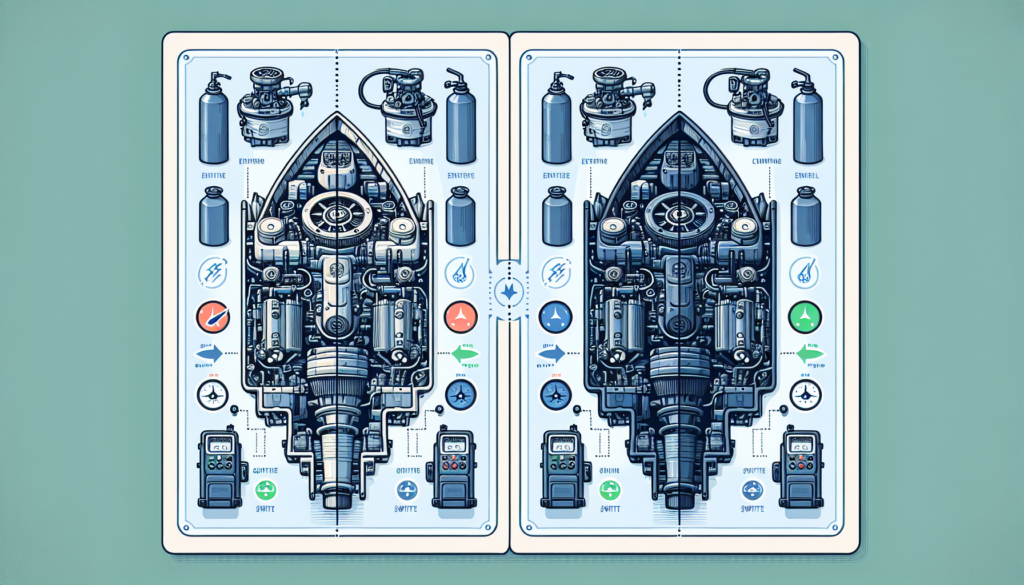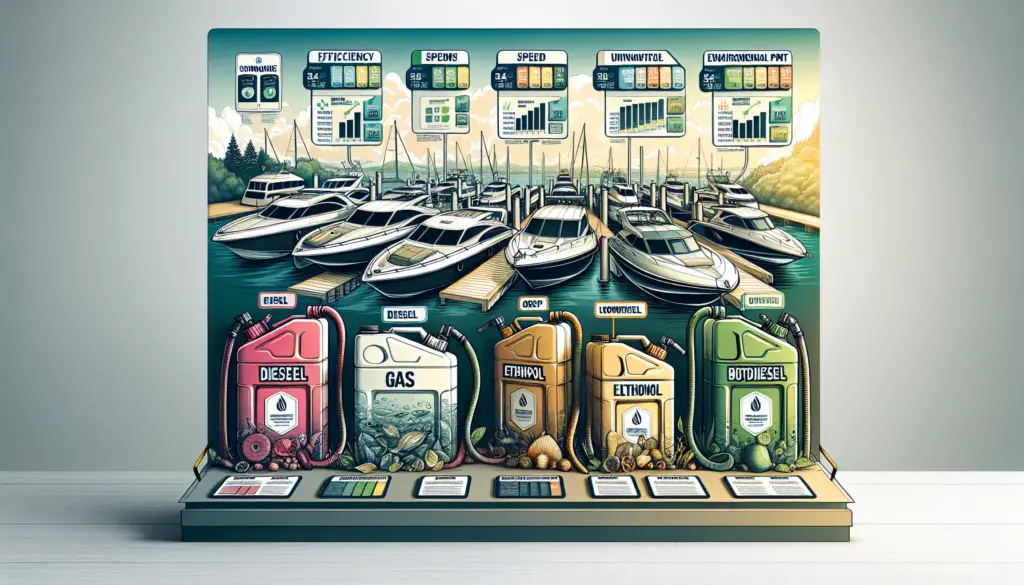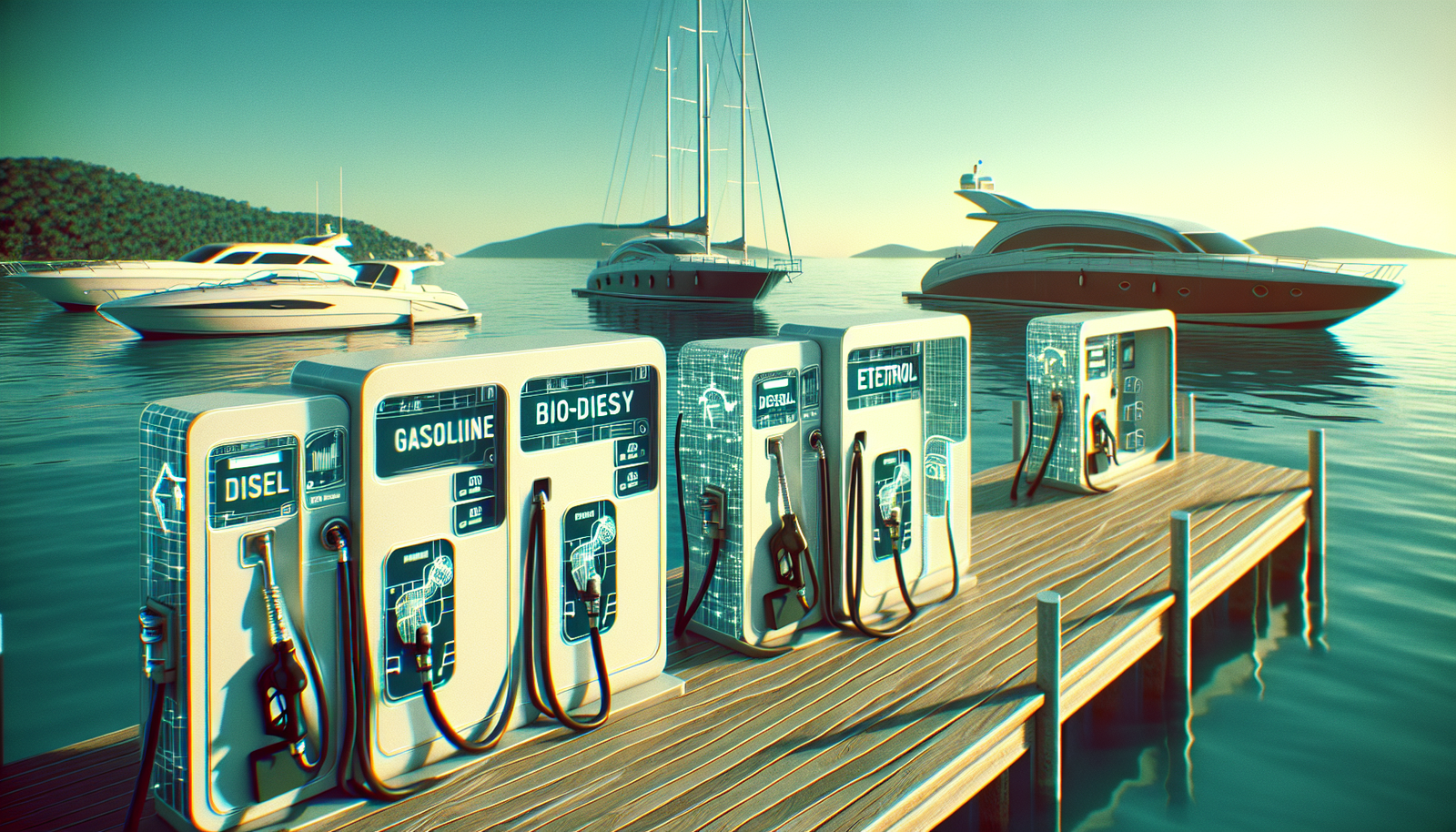Imagine you’re coasting on the water, the wind whipping through your hair as your boat cuts through the waves. There’s something thrilling about being on a boat, isn’t it? But have you ever stopped to consider what keeps your boat moving? The type of fuel your boat uses can have a significant influence on your boat’s engine performance. Let’s untangle the relationship between fuel type and engine performance, shedding light on the intricacies of boat functionality, fuel economy, and overall efficiency. Whether you’re an avid boater or a novice, understanding this correlation can help optimize your marine experience. So, sit tight as we journey into the world of boat engines and their fuel dependencies.

Understanding Different Fuel Types
If you own a boat, your selection of the fuel type is far from a trivial decision. It’s key to how your engine performs, costs and the environment. Let’s begin by comparing petrol and diesel fuels.
Petrol Vs Diesel
Petrol and diesel are both derived from crude oil but are refined differently. Petrol engines ignite the air-fuel mixture by the spark from spark-plugs, whereas diesel engines use compression ignition, making diesel engines more fuel-efficient but less powerful than their petrol counterparts.
Bio-Diesel
Bio-diesel is produced from plants or vegetable oils rather than from crude oil, which makes this fuel more renewable and environmentally friendly. It’s used in diesel engines without requiring significant modifications.
Electricity
Electricity is stored in batteries and drives the electric motor. Electric engines are known for their instant torque, silence and zero local emissions. However, they need regular recharging and the infrastructure is still in growing stages.
Hydrogen Fuel
Hydrogen, when used in fuel cells or burnt in internal combustion engines, results in no carbon emissions, only water. While it seems ideal, hydrogen production itself is energy-intensive and storing hydrogen is a major issue.
Petrol Engines and Their Performance
How Petrol Engines Work
Petrol engines use a four-stroke combustion cycle: intake, compression, combustion, and exhaust. In the intake stroke, the air-fuel mixture enters the cylinder. Then it’s compressed and ignited by a spark from the spark-plug. The consequential explosion pushes the piston down, turning the crankshaft. Finally, exhaust gases are expelled.
Advantages of Petrol Engines
Petrol engines are lauded for their responsiveness and raw power. These engines are also lighter, cheaper and more quiet than diesel engines. Moreover, petrol is widely available and serviced.
Disadvantages of Petrol Engines
Petrol engines are fuel-hungry and produce more CO2 emissions. The more volatile nature of petrol makes these engines more prone to overheating and detonation risks.
Diesel Engines and Their Performance
How Diesel Engines Work
Like petrol engines, diesel engines also use the four-stroke combustion cycle. But instead of using a spark for ignition, air is compressed enough to heat up to a temperature that can ignite diesel fuel.
Advantages of Diesel Engines
Diesel engines are noted for their torque and better fuel efficiency, making them perfect for long runs. They typically have a longer lifespan and require less maintenance.
Disadvantages of Diesel Engines
Diesel engines are heavier, a bit noisy and have higher initial costs. While they emit less CO2 than petrol, they produce more particulates and nitrogen oxides.
Bio-Diesel Engines and Their Performance
How Bio-Diesel Engines Work
Bio-diesel is used in standard diesel engines without any modifications. These engines operate in the same manner as with diesel fuel.
Advantages of Bio-Diesel Engines
Bio-diesel is renewable and biodegradable. It provides similar performance to diesel while dramatically reducing CO2 emissions.
Disadvantages of Bio-Diesel Engines
One caveat is that bio-diesel is not as readily available as petrol or diesel. It can cause problems in cold climates as it can solidify in the fuel system.

Electric Engines and Their Performance
How Electric Engines Work
Electric engines convert electrical energy stored in batteries into mechanical energy, which then drives the propellers.
Advantages of Electric Engines
Electric engines are compact, quiet, and efficient, with no local emissions. They offer instantaneous torque, providing remarkable acceleration from standstill.
Disadvantages of Electric Engines
Electric engines are subject to a limited battery range and long recharge times. Furthermore, the coastal infrastructure for charging electric boats is still in development.
Hydrogen Fuel Engines and Their Performance
How Hydrogen Fuel Engines Work
In hydrogen engines, hydrogen gas is fed into the engine and ignited by a spark just like petrol. Alternatively, a fuel cell can convert the chemical energy from hydrogen directly into electricity.
Advantages of Hydrogen Fuel Engines
Hydrogen engines are powerful and only emit water, presenting a clean possibility for the future.
Disadvantages of Hydrogen Fuel Engines
Hydrogen is challenging to store and transport, and can also lead to metal fatigue in the engine. Hydrogen production is also energy-intensive.

How Fuel Type Affects Speed
Speed for Petrol Engines
Petrol engines can deliver higher speeds due to their higher power output.
Speed for Diesel Engines
Diesel engines can’t match petrol engines in terms of speed, but provide steady power delivery ideal for longer, smoother rides.
Speed for Bio-Diesel Engines
Engines running on bio-diesel perform similarly to diesel engines, though a slight drop in speed might be noticed due to lesser energy content than diesel.
Speed for Electric Engines
Electric engines offer rapid acceleration from standstill but may struggle to maintain high top-speeds over a significant range.
Fuel Consumption Rates
Fuel Consumption of Petrol Engines
Petrol engines are the least fuel efficient due to the lower energy content of petrol and the engine’s workings.
Fuel Consumption of Diesel Engines
Diesel engines are more fuel-efficient, thanks to the higher energy content of diesel and their mode of operation.
Fuel Consumption of Bio-Diesel Engines
Bio-diesel has a lower energy content than diesel, therefore consumption rates might be slightly higher.
Fuel Consumption of Electric Engines
Electric motors are highly efficient with negligible energy wastage, leading to quite low energy consumption rates.

Cost Implications of Different Fuel Types
Cost of Petrol
Petrol is priced moderately and is readily available.
Cost of Diesel
Diesel is generally cheaper than petrol, but the engine’s upfront cost is high.
Cost of Bio-Diesel
Bio-diesel may cost more than regular diesel.
Cost of Electricity
Electricity is cheaper than any fossil fuels. However, the cost of electric boating is highly influenced by the price of the battery systems.
Cost of Hydrogen Fuel
Hydrogen is expensive due to the high costs of production, storage and transportation.
Environmental Impact of Different Fuel Types
Environmental Impact of Petrol
Petrol engines emit a considerable amount of CO2 and contribute to global warming.
Environmental Impact of Diesel
Diesel generates less CO2 but more particulate matter and nitrogen oxides, detrimental to air quality.
Environmental Impact of Bio-Diesel
Bio-diesel leaves a much smaller carbon footprint, although the production process may impact the environment.
Environmental Impact of Electricity
Electric engines have zero local emissions, but their environmental impact depends on how the electricity is produced.
Environmental Impact of Hydrogen Fuel
The only by-product of burning hydrogen is water, but production and storage of hydrogen fuel can have environmental implications.
So when choosing the fuel type for your boat, take into account not just the performance but the cost and environmental impact too. It’s a choice that doesn’t just affect you, but the whole marine world.

